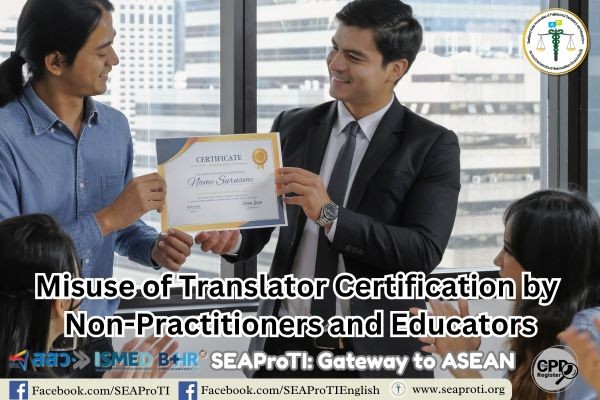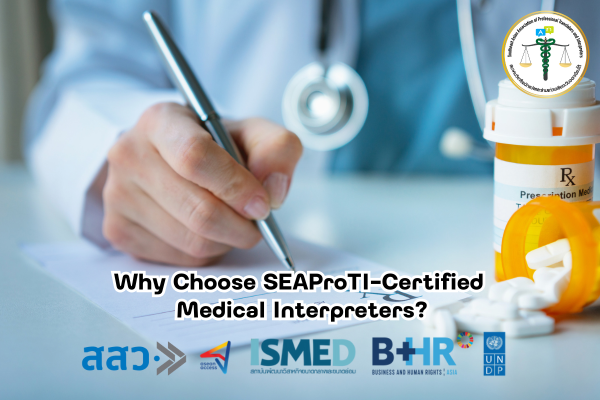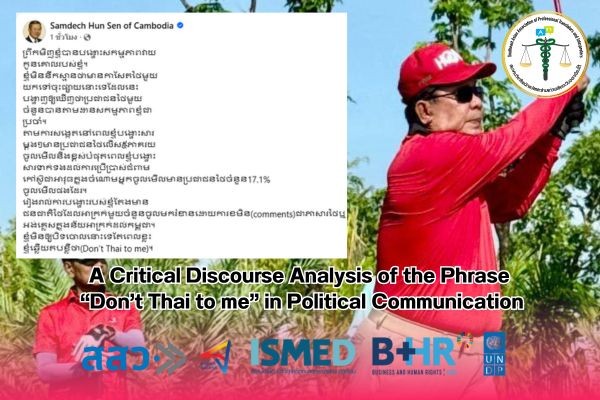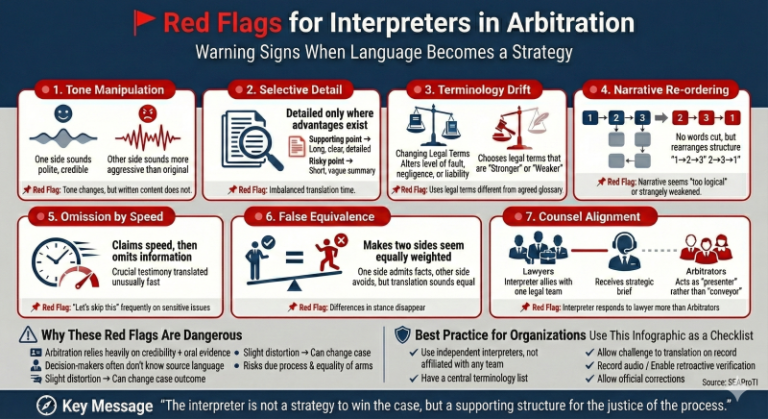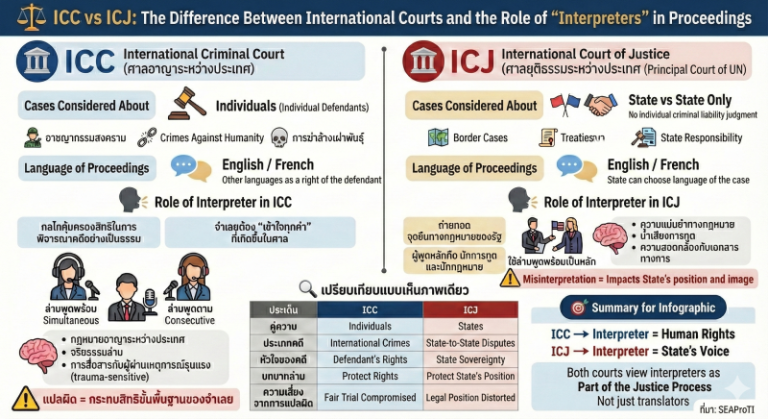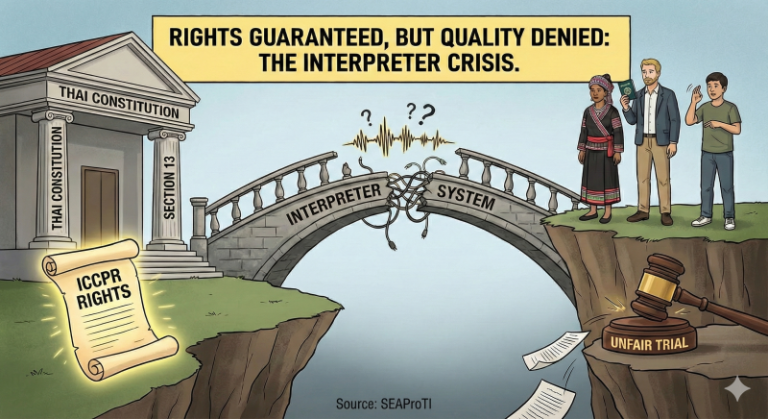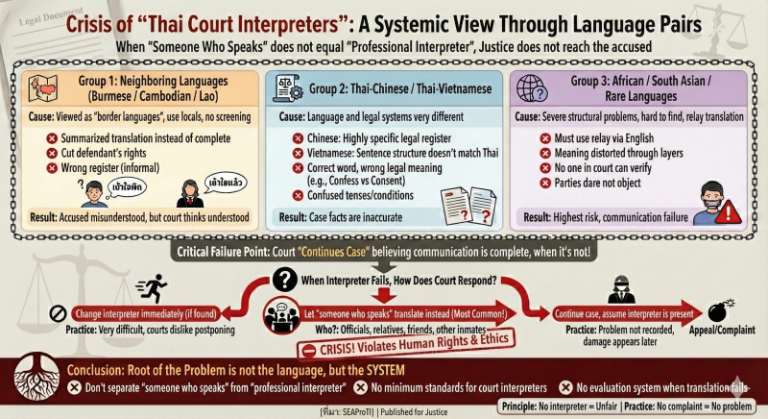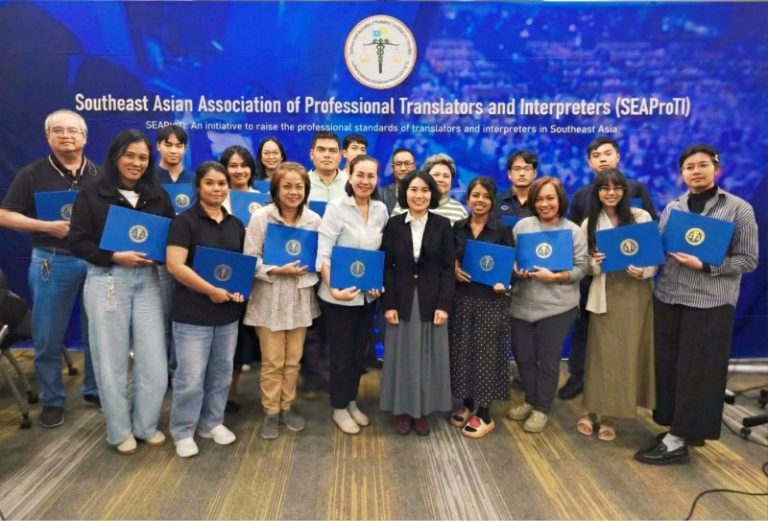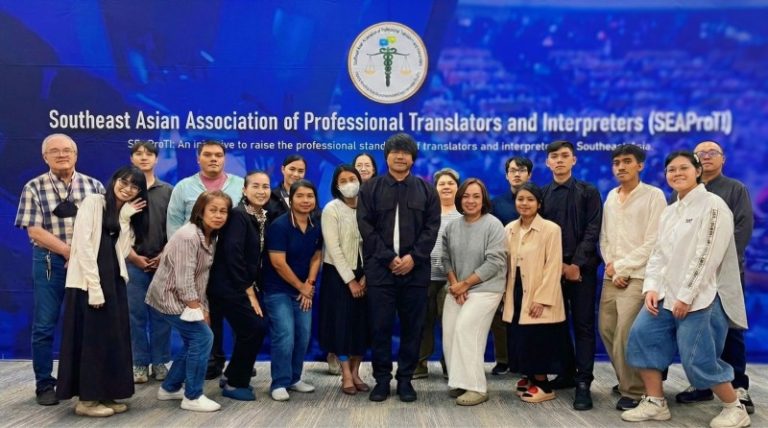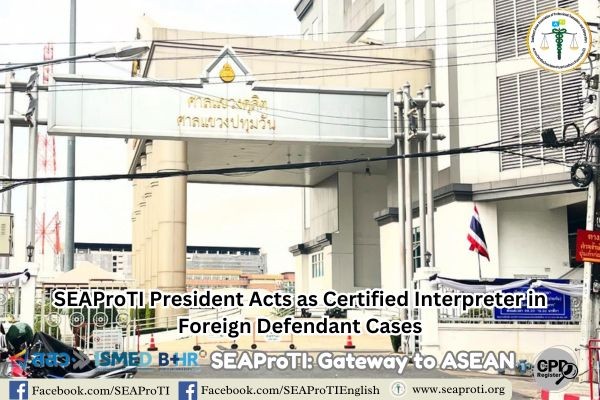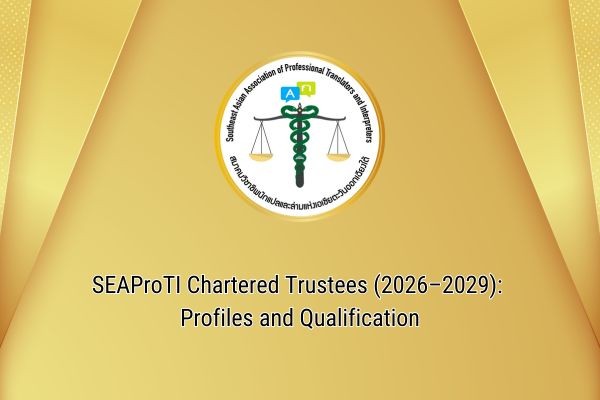Ethical and Professional Issues in Translator Certification Among Non-Practitioners and Educators
A Case Study on Misuse of Professional Credentials in the Translation Field
18 October 2025, Bangkok – This paper examines emerging ethical and professional issues in the certification process of professional translators’ associations, particularly involving applicants who are language educators or academics rather than active practitioners. Many such applicants pursue certification or training merely to obtain certificates for career promotion, salary advancement, or academic recognition rather than to practice translation professionally. These practices undermine the credibility of certification systems and distort the meaning of professional recognition. The article analyzes the root causes, ethical implications, and systemic impacts of this phenomenon, and proposes policy-based solutions to restore integrity and trust in professional certification.
Subcontracting Translation Tasks to Students
One major ethical breach involves educators submitting translations completed by their students as part of their professional certification portfolios. Such acts constitute academic and professional misconduct (SEAProTI, 2024), as the certification process is designed to assess the applicant’s own ability, not that of others.
To address this, associations should introduce performance-based assessments and require proof of authorship for submitted translations, such as signed declarations or traceable project records, ensuring the authenticity of applicants’ work.
Another recurring issue concerns individuals who enroll in translation training programs solely to obtain certificates for academic rank promotion or salary increments, without intending to work as professional translators. This misuse converts certification bodies from “professional regulators” into “certificate-issuing entities” (Chandran, 2022).
A more sustainable model would clearly separate:
- General knowledge courses — for those seeking language or translation awareness without professional credentialing; and
Professional certification courses — requiring evidence of real translation practice and competency testing.
Some certified individuals use their professional licenses or certificates for unrelated purposes—such as self-promotion, teaching credentials, or institutional advancement—without actively practicing translation.
This confusion between a professional license and a certificate of attendance undermines the ethical foundation of credentialing systems (Tymoczko, 2014).
Professional associations should therefore adopt renewal systems and continuing professional development (CPD) requirements to ensure that certified members continue to engage in real translation work. Where misuse is detected, membership suspension or revocation should follow.
The misuse of certification affects the translation industry in several ways:
- Erosion of professional credibility — The public can no longer differentiate between genuine professionals and nominal certificate holders.
- Decline in translation quality — Certified individuals lacking practical experience may produce inaccurate or unreliable work, especially in legal or official contexts.
- Demotivation among practitioners — Genuine translators lose faith in certification systems that fail to uphold professional merit.
To safeguard the credibility and sustainability of translator certification systems, the following policy measures are recommended:
Establish a Peer Review Committee to evaluate submitted translation samples for quality and authenticity.
Implement annual renewal requirements, including proof of practice and CPD participation.
Issue guidelines on proper use of professional credentials, clarifying ethical and legal limitations.
Foster a culture of professional integrity among educators and language professionals, emphasizing honesty and accountability.
Conclusion
Certification in translation should represent not just documentation but a commitment to competence, ethics, and public responsibility. When individuals misuse certification for personal advancement rather than professional practice, it diminishes the value of the credential and harms the entire profession.
Professional associations must therefore uphold the principle of “quality over quantity” by maintaining rigorous assessment and renewal standards. Only then will the title Certified Translator truly signify professional ability, ethical conduct, and societal trust 🌍.
References
- Brown, T. (2020). Professional standards and ethics in translation and interpreting. Routledge.
- Chandran, R. (2022). Certification and credential misuse in language professions: An ethical review. Journal of Applied Linguistic Practice, 14(2), 87–102.
- SEAProTI. (2024). Code of professional ethics and membership regulations. Southeast Asian Association of Professional Translators and Interpreters.
- Tymoczko, M. (2014). The social responsibility of the translator: Ethical frameworks and institutional power. Translation Studies Review, 6(1), 33–47.
The Southeast Asian Association of Professional Translators and Interpreters (SEAProTI) has formally announced the qualifications and requirements for registration of Certified Translators, Translation Certification Providers, and Certified Interpreters in Sections 9 and 10 of the Royal Gazette, published by the Secretariat of the Cabinet, Office of the Prime Minister of Thailand, on 25 July 2024 (Vol. 141, Part 66 Ng, p. 100). Certified Translators, Translation Certification Providers, and Certified Interpreters
The Council of State has proposed the enactment of a Royal Decree, granting registered translators and recognized translation certifiers from professional associations or accredited language institutions the authority to provide legally valid translation certification (Letter to SEAProTI dated April 28, 2025)
SEAProTI is the first professional association in Thailand and Southeast Asia to implement a comprehensive certification system for translators, certifiers, and interpreters.
Head Office: Baan Ratchakru Building, No. 33, Room 402, Soi Phahonyothin 5, Phahonyothin Road, Phaya Thai District, Bangkok 10400, Thailand
Email: hello@seaproti.com | Tel.: (+66) 2-114-3128 (Office hours: Mon–Fri, 09:00–17:00)
ปัญหาเชิงจริยธรรมและการใช้ระบบรับรองวิชาชีพผิดวัตถุประสงค์ในวงการแปล
18 ตุลาคม 2568, กรุงเทพมหานคร – บทความนี้วิเคราะห์ปัญหาที่เกิดขึ้นในกระบวนการรับรองสมาชิกของสมาคมวิชาชีพนักแปล โดยเฉพาะกรณีของผู้สมัครที่เป็นครู อาจารย์ หรือผู้สอนภาษา ซึ่งมิได้ประกอบอาชีพแปลจริง แต่เข้ามาขอรับรองเพื่อวัตถุประสงค์อื่น เช่น การใช้ใบประกาศในการเลื่อนวิทยฐานะ หรือการอ้างสิทธิ์ทางวิชาชีพ ปัญหาดังกล่าวส่งผลกระทบโดยตรงต่อความน่าเชื่อถือของระบบรับรองและภาพลักษณ์ของนักแปลมืออาชีพ บทความนี้นำเสนอทั้งการวิเคราะห์เชิงจริยธรรม ผลกระทบ และแนวทางเชิงนโยบายเพื่อการแก้ไขอย่างยั่งยืน
การมอบหมายงานแปลให้ผู้อื่นแทนตนเอง
หนึ่งในปัญหาหลักคือ การที่ผู้สมัครซึ่งเป็นอาจารย์นำ “งานแปลของนักศึกษา” มายื่นเป็นผลงานของตนเอง เพื่อประกอบการสมัครรับรองหรือยื่นขอเลื่อนตำแหน่งทางวิชาการ การกระทำเช่นนี้ถือเป็นการละเมิดจรรยาบรรณอย่างร้ายแรง (SEAProTI, 2024) เพราะระบบรับรองมีเป้าหมายเพื่อประเมินความสามารถส่วนบุคคลของผู้สมัคร ไม่ใช่การประเมินทักษะของผู้อื่น
แนวทางแก้ไขที่เหมาะสมคือการกำหนดให้มี “การสอบปฏิบัติจริง” (performance-based assessment) และ “การสุ่มตรวจสอบผลงาน” พร้อมหนังสือรับรองความถูกต้องของงานแปล เพื่อยืนยันว่าผู้สมัครเป็นผู้ปฏิบัติงานด้วยตนเองจริง
การอบรมเพื่อผลประโยชน์ทางตำแหน่งมากกว่าความเชี่ยวชาญ
อีกหนึ่งปัญหาที่พบคือ ผู้สมัครบางรายเข้าร่วมอบรมหลักสูตรแปลของสมาคมเพียงเพื่อให้ได้ “ใบประกาศนียบัตร” ไปใช้ประกอบการเลื่อนวิทยฐานะ หรือขอรับเงินเพิ่มตามหลักเกณฑ์ราชการ โดยไม่ได้มีเจตนาจะประกอบอาชีพนักแปลอย่างแท้จริง
การกระทำเช่นนี้ทำให้ระบบรับรองถูกบิดเบือนจาก “กลไกคัดกรองมืออาชีพ” ไปเป็นเพียง “ช่องทางสร้างคุณสมบัติทางเอกสาร” (Chandran, 2022) ซึ่งทำลายคุณค่าของระบบและศรัทธาจากผู้มีส่วนได้ส่วนเสียในวิชาชีพ
การแก้ไขควรเริ่มจากการแยกหลักสูตรออกเป็นสองประเภท ได้แก่
- หลักสูตรเพื่อพัฒนาความรู้ทั่วไป (Non-certification course) สำหรับผู้ที่สนใจเรียนรู้การแปล
- หลักสูตรเพื่อการรับรองวิชาชีพ (Professional certification course) ซึ่งต้องมีหลักฐานการทำงานจริง และผ่านการสอบประเมินสมรรถนะ
หลังได้รับใบอนุญาตหรือใบรับรอง บางรายนำไปใช้ในทางที่ไม่ตรงกับวัตถุประสงค์ เช่น การโปรโมทตนเองเพื่อขอเลื่อนตำแหน่ง อ้างเครดิตในการสอน หรือสร้างภาพลักษณ์ความเป็น “ผู้เชี่ยวชาญด้านภาษา” โดยไม่ปฏิบัติหน้าที่นักแปลจริง
การกระทำเช่นนี้สะท้อนถึงความเข้าใจผิดระหว่าง “ใบอนุญาตทางวิชาชีพ” (professional license) กับ “ใบรับรองการอบรม” (certificate of attendance) ซึ่งควรถูกแยกให้ชัดเจน (Tymoczko, 2014)
สมาคมวิชาชีพจึงควรมีระบบ ต่ออายุใบอนุญาต (Renewal) และ การพัฒนาอย่างต่อเนื่อง (Continuing Professional Development: CPD) เพื่อประเมินว่าผู้ถือใบอนุญาตยังคงประกอบอาชีพแปลจริงตามหลักจรรยาบรรณ หากพบการนำใบรับรองไปใช้ในทางมิชอบ ควรมีมาตรการระงับหรือเพิกถอนสถานะสมาชิก
ผลกระทบเชิงระบบต่อวงการแปล
เมื่อระบบรับรองถูกใช้ในทางที่ผิด ย่อมส่งผลโดยตรงต่อ
- ความน่าเชื่อถือขององค์กรวิชาชีพ — ทำให้สาธารณชนไม่สามารถแยกแยะระหว่างผู้แปลมืออาชีพกับผู้ถือใบประกาศทั่วไป
- คุณภาพของการให้บริการแปล — ผู้ถือใบรับรองที่ขาดประสบการณ์จริงอาจสร้างความเสียหายต่อคู่สัญญาหรือศาลในคดีที่ต้องใช้เอกสารแปลอย่างเป็นทางการ
- แรงจูงใจของผู้ประกอบอาชีพจริง — นักแปลมืออาชีพอาจรู้สึกหมดศรัทธา หากระบบรับรองไม่สะท้อนคุณค่าแห่งความสามารถอย่างแท้จริง
เพื่อฟื้นฟูความน่าเชื่อถือของระบบรับรอง ควรดำเนินการในเชิงนโยบายดังนี้
- จัดตั้ง คณะกรรมการตรวจสอบผลงาน (Peer Review Committee) สำหรับการประเมินคุณภาพงานแปลที่ยื่นขอรับรอง
- กำหนด เกณฑ์ต่ออายุใบรับรองรายปี โดยต้องมีหลักฐานการทำงานจริง และการเข้ารับอบรม CPD
- ประกาศ แนวปฏิบัติว่าด้วยการใช้ใบรับรองอย่างเหมาะสม เพื่อป้องกันการนำไปใช้ในทางมิชอบ
- ส่งเสริม วัฒนธรรมความซื่อสัตย์ทางวิชาชีพ (Professional Integrity Culture) ในกลุ่มครู อาจารย์ และผู้สอนภาษา
การรับรองคุณวุฒิในวิชาชีพนักแปลไม่ควรเป็นเพียงกระบวนการทางเอกสาร แต่เป็นการยืนยันถึง “ความสามารถ จริยธรรม และความรับผิดชอบต่อสังคม” ของผู้ประกอบอาชีพ การนำระบบนี้ไปใช้เพื่อผลประโยชน์ส่วนตัว เช่น การเลื่อนตำแหน่งหรือการสร้างเครดิตส่วนบุคคล เป็นการบั่นทอนคุณค่าแห่งวิชาชีพอย่างร้ายแรง
สมาคมวิชาชีพควรยึดมั่นในหลักการ “รับรองเพื่อคุณภาพ ไม่ใช่เพื่อจำนวน” และพัฒนาเกณฑ์คัดกรองให้เข้มแข็ง เพื่อให้คำว่า “นักแปลรับรอง” หมายถึงบุคคลที่ทำงานจริง มีจรรยาบรรณจริง และได้รับความไว้วางใจจากสังคมอย่างแท้จริง
เอกสารอ้างอิง (References)
- Brown, T. (2020). Professional standards and ethics in translation and interpreting. Routledge.
- Chandran, R. (2022). Certification and credential misuse in language professions: An ethical review. Journal of Applied Linguistic Practice, 14(2), 87–102.
- SEAProTI. (2024). Code of professional ethics and membership regulations. Southeast Asian Association of Professional Translators and Interpreters.
- Tymoczko, M. (2014). The social responsibility of the translator: Ethical frameworks and institutional power. Translation Studies Review, 6(1), 33–47.
สมาคมวิชาชีพนักแปลและล่ามแห่งเอเชียตะวันออกเฉียงใต้ (SEAProTI) ได้ประกาศหลักเกณฑ์และคุณสมบัติผู้ที่ขึ้นทะเบียนเป็น “นักแปลรับรอง (Certified Translators) และผู้รับรองการแปล (Translation Certification Providers) และล่ามรับรอง (Certified Interpreters)” ของสมาคม หมวดที่ 9 และหมวดที่ 10 ในราชกิจจานุเบกษา ของสำนักเลขาธิการคณะรัฐมนตรี ในสำนักนายกรัฐมนตรี แห่งราชอาณาจักรไทย ลงวันที่ 25 ก.ค. 2567 เล่มที่ 141 ตอนที่ 66 ง หน้า 100 อ่านฉบับเต็มได้ที่: นักแปลรับรอง ผู้รับรองการแปล และล่ามรับรอง
สำนักคณะกรรมการกฤษฎีกาเสนอให้ตราเป็นพระราชกฤษฎีกา โดยกำหนดให้นักแปลที่ขึ้นทะเบียน รวมถึงผู้รับรองการแปลจากสมาคมวิชาชีพหรือสถาบันสอนภาษาที่มีการอบรมและขึ้นทะเบียน สามารถรับรองคำแปลได้ (จดหมายถึงสมาคม SEAProTI ลงวันที่ 28 เม.ย. 2568)
สมาคมวิชาชีพนักแปลและล่ามแห่งเอเชียตะวันออกเฉียงใต้ เป็นสมาคมวิชาชีพแห่งแรกในประเทศไทยและภูมิภาคเอเชียตะวันออกเฉียงใต้ที่มีระบบรับรองนักแปลรับรอง ผู้รับรองการแปล และล่ามรับรอง
สำนักงานใหญ่: อาคารบ้านราชครู เลขที่ 33 ห้อง 402 ซอยพหลโยธิน 5 ถนนพหลโยธิน แขวงพญาไท เขตพญาไท กรุงเทพมหานคร 10400 ประเทศไทย
อีเมล: hello@seaproti.com โทรศัพท์: (+66) 2-114-3128 (เวลาทำการ: วันจันทร์–วันศุกร์ เวลา 09.00–17.00 น.)


